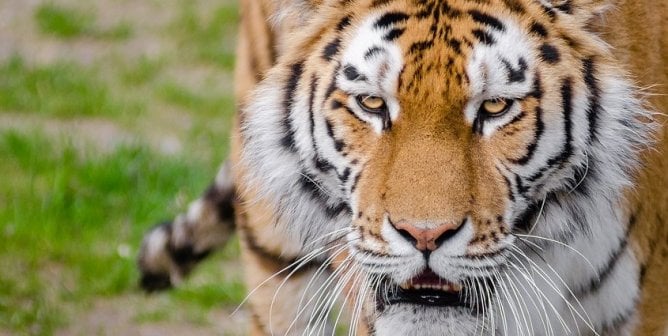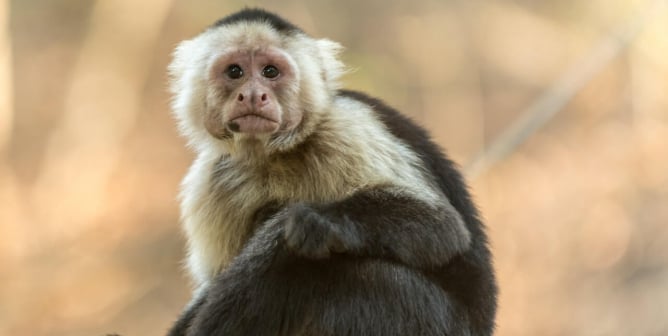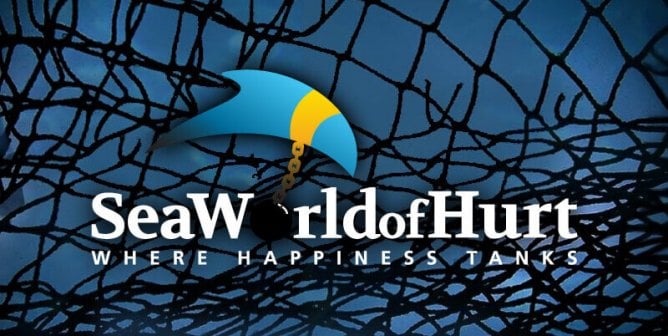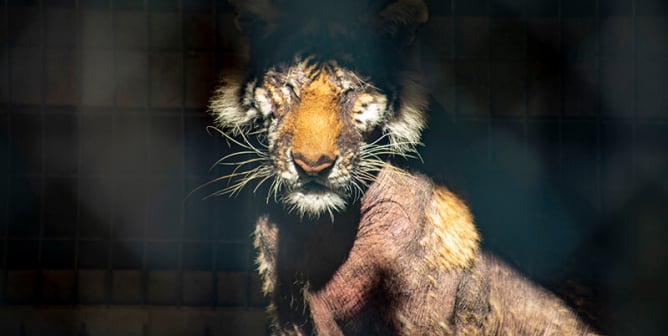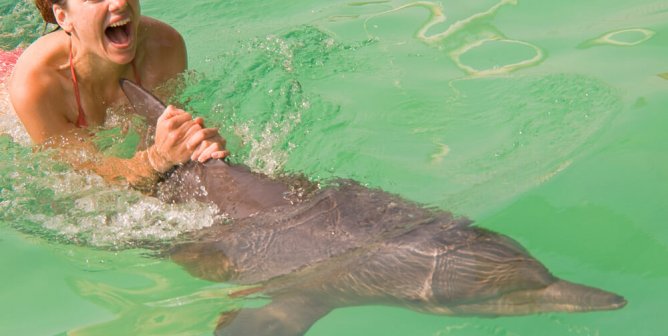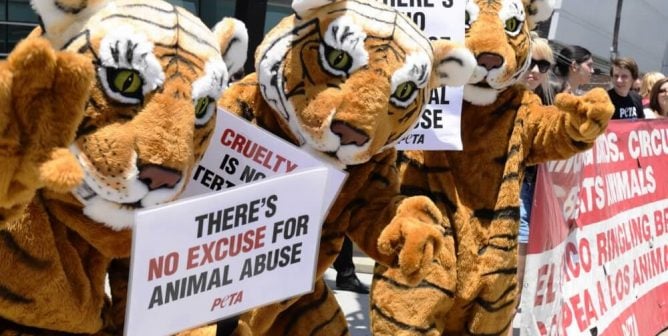Animals Used for Entertainment
Animals aren’t actors, spectacles to imprison and gawk at, or circus clowns. Yet thousands of elephants, bears, apes, and others are forced to perform silly, difficult tricks under the threat of physical punishment; carted across the country in cramped, stuffy semi-truck trailers; kept chained or caged in barren, filthy enclosures; and regularly separated from their families and friends—all for the sake of entertainment. Many of them are even forced to perform until the day they die.
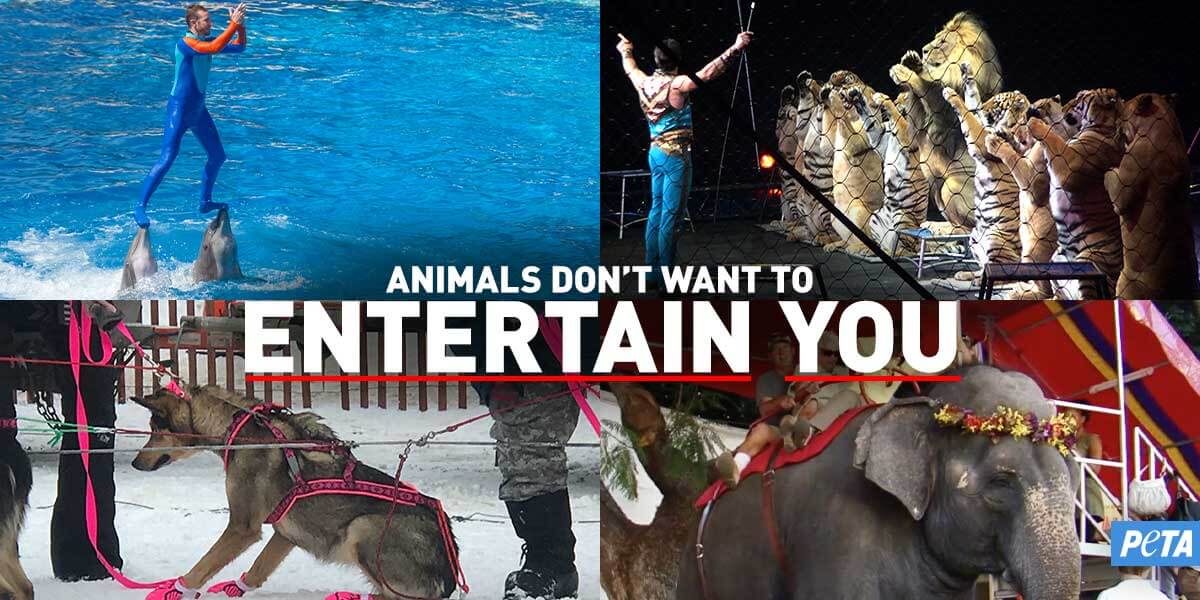
PETA is determined to get animals out of the entertainment business. Our dedicated staff members work full time exposing and ending animal abuse in the entertainment industry, and their work is paying off: Consider the demise of Ringling Bros. circus, for example. In addition to ending circus cruelty, these staff members work with officials to overhaul horseracing rules nationwide, spearhead hard-hitting undercover investigations and public campaigns that are crucial in turning public opinion against animal-exploiting attractions, persuade travel companies to stop selling tickets to SeaWorld and other cruel operations, persuade companies like Coca-Cola to stop sponsoring abusive forms of entertainment such as the deadly Iditarod, persuade entertainment executives not to use animals in movies or TV and to use motion-capture technology instead, chip away at abusive animal exhibitors like the Mobile Zoo, and facilitate the transfer of neglected animals from roadside zoos, traveling menageries, and other seedy facilities to reputable sanctuaries.
Circus acts featuring only willing human performers, TV shows and films using CGI animals, and interactive, virtual reality aquariums are captivating audiences. Meanwhile, archaic, cruel animal acts are on the decline. Thanks in part to PETA’s work, public opposition to horseracing cruelty, marine parks, dog sledding, elephant rides, cockfighting, petting zoos, horse-drawn carriage rides, bullfighting, sport fishing, trophy hunting, rodeos, traveling animal acts, roadside zoos, and safari parks has never been stronger. Animal-free forms of entertainment teach audience members about conservation—something places that imprison and enslave animals, such as SeaWorld, only pretend to do.
What’s Wrong With Circuses? And Is SeaWorld Really That Bad?
Animals don’t like to put on shows—they’re used and abused for the sake of human entertainment. To force bears, elephants, tigers, and others in circuses to perform confusing and physically demanding tricks, trainers use bullhooks, whips, tight collars, muzzles, electric prods, and other painful tools of the trade. Frustrated by years of beatings and confinement, many of them snap—countless animals, trainers, and members of the public have been injured and even killed.
Animals held captive at marine parks or in aquariums don’t fare much better. In captivity, orcas and other dolphins swim in endless circles in tanks that, to them, are the equivalent of bathtubs, and they’re denied the opportunity to engage in almost any natural behavior. Instead, some are forced to perform meaningless tricks. Most die far short of their natural life expectancy.
The dead bodies of tigers at pseudo-sanctuaries, bears confined to cages and pits, and bulls forced to buck and fight are stacking up, too.
There’s only one acceptable thing to do with animals exploited for entertainment: Retire them to reputable sanctuaries or loving homes.
PETA has helped facilitate such transfers, as in the case of Nosey the elephant—we campaigned for her freedom from the circus for years, and now she’s loving her sanctuary home in Tennessee. Charlie, a Thoroughbred horse on the brink of a fatal breakdown, was also rescued by PETA—he now spends his days grazing on grass in a large pasture with his guardian, a longtime PETA supporter and friend. And then there was Tregembo Animal Park in North Carolina, which two local animal advocates represented by PETA’s lawyers successfully sued, allowing us to transfer bears Ben and Bogey to a sprawling Colorado sanctuary. Between 2013 and 2018, PETA saved more than 70 bears from cramped pens and concrete hells, helping to transfer them to true sanctuaries where they can finally play, climb, have friends, and raise their families. Some of our rescues have even helped shut down roadside zoos.
How You Can Help Animals Forced to Perform or Fight
These life-changing victories wouldn’t be possible without the help of our members and supporters. Each of us can help prevent suffering and deaths by refusing to buy a ticket to watch broken animals languish in captivity or perform stupid tricks, demanding that government agencies like the U.S. Department of Agriculture do their jobs, and urging companies not to do business with animal-exploiting operations.
With the help of our members and supporters, PETA works globally to expose and end the use of animals in entertainment. Some of our efforts include the following:
- Conducting groundbreaking undercover investigations and colorful advocacy campaigns to inform the public
- Persuading government agencies to hold circuses, roadside zoos, marine parks, and other operations accountable when they apparently violate the law
- Encouraging companies to refuse to promote or sponsor elephant rides, tiger encounters, “swim with dolphins” excursions, the Iditarod, or other animal attractions
- Advocating for pro-animal legislation
- Organizing spirited protests outside businesses and company headquarters to help prevent new animal-exploiting attractions from opening
- Calling on roadside zoos and traveling menageries to do the right thing by retiring animals to reputable sanctuaries
- Persuading county and state fairs to exclude wild animals from their attractions
This multifaceted approach yields scores of victories for animals imprisoned and used by the entertainment industry around the world.
Popular Resources
We’ve seen it at circuses and marine parks, at roadside zoos and racetracks: When animals are used for entertainment, they suffer—and the film and TV industries are no exception. Often torn away from their mothers as infants and subjected to lives of punishment and deprivation, animals used in movie and television productions have no control … Read more »
Which roadside zoos are the latest highway hellholes to avoid? PETA’s dishing the dirt and urging you to help end animals’ suffering.
Did you know the tourism industry exploits over half a million animals every year? PETA has tips to help you travel vegan.
One page—multiple opportunities to help. Let’s end the exploitation of animals used in circus acts. Click now to start taking action!

